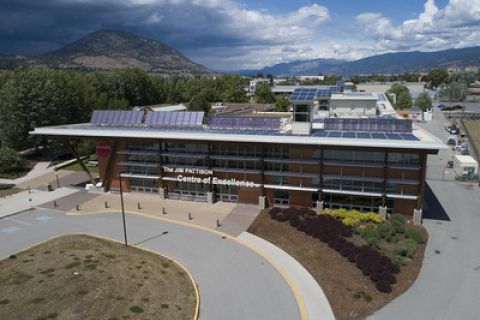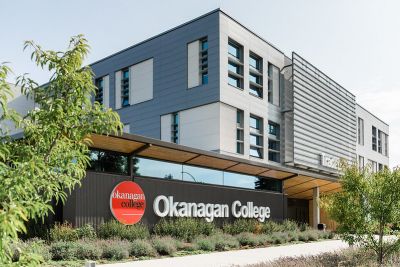Okanagan College joins Mohawk and other institutions across Canada to form Canadian Colleges for a Resilient Recovery

Eight colleges, institutions, CEGEPs to support new climate-resistant economy
Okanagan College is joining forces with a group of colleges, institutions, polytechnics and CEGEPs from across Canada to educate a post-pandemic workforce to support a new climate-focused economic recovery.
The group of eight climate-action leading institutions from all regions of the country have launched an initiative called Canadian Colleges for a Resilient Recovery. The group will champion projects across Canada to support a recovery that delivers good jobs, is positive for the environment, and addresses socio-economic inequality.
And the collaboration is already in motion. This week Okanagan College and Mohawk College signed a letter of intent outlining ways in which they’ll work together on the initiative.
“Mohawk College has aligned itself with institutional environmental leaders across the country to share resources and best practices in order to educate and train students for the climate-resilient jobs of the future,” said Ron McKerlie, president of Mohawk College. “Yesterday’s Throne Speech indicated that climate action will be a cornerstone of our plan to support and create a million jobs across the country. We believe that colleges are in an ideal situation to support a sustainable economic recovery in Canada. We are working together to ensure we are ready to respond to emerging workforce training needs as soon as a post-pandemic recovery begins.”
The group formed to take meaningful action as a direct response to the 5 bold moves and 22 recommendations of the Task Force for a Resilient Recovery, which recommended a $55.4 billion strategy for a green recovery in Canada that will support long-term jobs and economic growth and keep Canada competitive in the quickly-evolving global marketplace.
“In its final report, the Task Force for a Resilient Recovery emphasized the importance of training and education for building a long-term economic recovery from covid-19,” said Richard Florizone, President & CEO of the International Institute for Sustainable Development, and Chair of the Task Force for a Resilient Recovery. “Without a skilled Canadian workforce, the jobs of the clean economy will go to other countries. Through programs like Canadian Colleges for a Resilient Recovery, we can make sure that it’s Canadians who benefit from the jobs and growth of a cleaner, more resilient economy.”
Canadian Colleges for a Resilient Recovery can help the Canadian economy build back better by:
- rapidly training workers to meet skills gaps for a climate resilient economy;
- reviving and developing Canadian businesses through applied research solutions; and
- serving as demonstration sites, living labs, for climate change solutions.
Collectively, the institutions are committed to advancing the following goals:
- Develop, implement and scale new curriculum and research initiatives to support a resilient recovery.
- Foster resilient recovery projects that support the recommendations of the Task Force for a Resilient Recovery.
- Serve as role models for the transition to a low-carbon, resilient and circular economy through campus practices, student engagement and community engagement.
- Support provincial/territorial college-level responses to the resilient recovery.
- Continue to support truth and reconciliation with First Nations, Inuit and Metis peoples, and champion Indigenous leadership in the resilient recovery.
Supporting its commitment to student engagement, Canadian Colleges for a Resilient Recovery has partnered with Student Energy, a global youth-led organization, empowering young people to accelerate the sustainable energy transition. Through Student Energy’s involvement, students will offer feedback and advice to help shape the initiatives of the college partners.
“Young people across the country are eager to participate in the transition to a low carbon, resilient, and equitable economy, and it is more important than ever that they are supported with the skills, knowledge, and networks they need to take part in the climate-resilient workforce,” said Student Energy Executive Director Meredith Adler. “Student Energy is excited to join forces with the Canadian Colleges for Resilient Recovery to provide tangible delivery skills training and opportunities for young people studying at colleges across Canada to be part of leading the sustainable energy transition.”
Canadian Colleges for a Resilient Recovery will meet quarterly (online) for an initial two years, providing a forum for colleges to share transferable and scalable recovery solutions from institutions across Canada. It will host a national webinar series, showcasing faculty and researchers from each member college.
Initially, Canadian Colleges for a Resilient Recovery will be chaired by Mohawk College President Ron McKerlie and the Centre for Climate Change Management at Mohawk College will act as the coalition’s administrative support. The group has retained internationally recognized sustainability researcher and advocate David Wheeler to advise the coalition.
The initial group of colleges in Canadian Colleges for a Resilient Recovery include:
- British Columbia Institute of Technology
- Okanagan College
- Southern Alberta Institute of Technology
- Mohawk College
- Seneca College
- Nergica, a Renewable Energy Research and Innovation College Centre
- Nova Scotia Community College
- Holland College
About Sustainability at Okanagan College

Okanagan College has established a strong track record of building LEED-certified facilities and has notched a number of green firsts for the region as well.
In 2015, the Jim Pattison Centre of Excellence in Sustainable Building Technologies and Renewable Energy Conservation at the Penticton campus became the first LEED Platinum-certified building of its size in the region. The following year, it was named the Greenest Post-Secondary Building in Canada by Corporate Knights magazine.
In 2017, Little Learners Academy, located on the College’s Penticton campus became Canada’s first Passive House certified child care centre.
In 2019, the College’s Kelowna Trades Complex also earned LEED Platinum Certification from the Canada Green Building Council (CaGBC).
Last year, the College partnered with UBC Okanagan to establish a Green Construction Research and Training Centre (GCRTC) that will provide new research options and create hands-on practical training opportunities for students.
Okanagan College offers a Sustainable Construction Management Technology diploma and a Post-Diploma Sustainability Studies Certificate, both of which are designed to meet the industry demand for builders, technologists and managers who are seeking specialization in sustainable construction.
Okanagan College offers a Sustainable Construction Management Technology diploma and a Post-Diploma Sustainability Studies Certificate, both of which are designed to meet the industry demand for builders, technologists and managers who are seeking specialization in sustainable construction.
Tags: Indigenization, Partnership, Sustainable Construction






